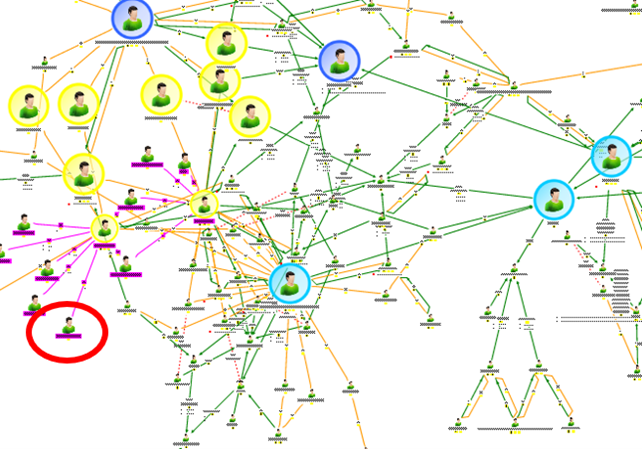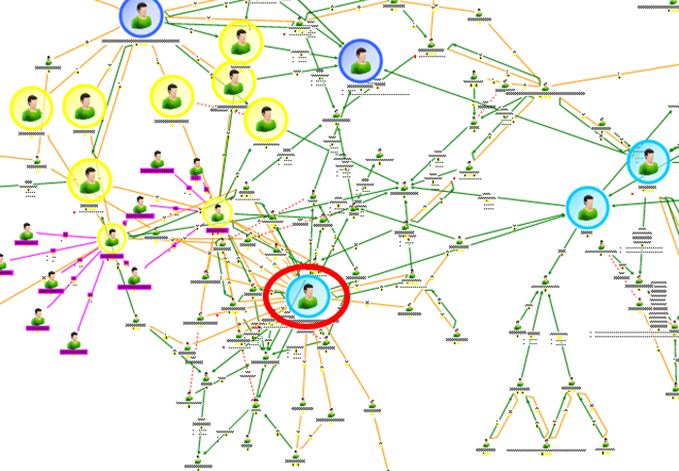Are you comfortable networking, or do you find meeting strangers awkward? Nadia Tuominen, a Senior Lecturer in Police Practice at Brunel University, reveals why analysts should embrace such opportunites, and, unexpectedly, how it compares to Organised Crime Groups.
The word ‘networking’ makes many people cringe inside. Approaching strangers. Talking to strangers. Smiling through gritted teeth whilst you wish you could just hide in a corner and mind your own business. Those were certainly my feelings in the early stages of my career, and I stubbornly stayed a solitary node on the edges of a professional community for many years, much like the person circled in red below.
 Working for the police, where job security was once a given, I was wrapped in a comfort blanket where I could sit in my cosy corner and be safe, no matter what. When austerity started to bite in the United Kingdom, and redundancies were threatened all round (and effected in many cases), it was a wake-up call. I started making greater efforts to connect with people, building my Degree centrality. The more people I came to know, the more I spotted collaborative opportunities, facilitating introductions, and reaching across my network to solve problems. Hello, Betweenness! And the longer I worked at this, the more I became connected to other people engaged in the same kind of ‘network puppeteering’, and so started to climb the ladder of Eigenvector centrality. I became more like the red-encircled person.
Working for the police, where job security was once a given, I was wrapped in a comfort blanket where I could sit in my cosy corner and be safe, no matter what. When austerity started to bite in the United Kingdom, and redundancies were threatened all round (and effected in many cases), it was a wake-up call. I started making greater efforts to connect with people, building my Degree centrality. The more people I came to know, the more I spotted collaborative opportunities, facilitating introductions, and reaching across my network to solve problems. Hello, Betweenness! And the longer I worked at this, the more I became connected to other people engaged in the same kind of ‘network puppeteering’, and so started to climb the ladder of Eigenvector centrality. I became more like the red-encircled person.
 Being immersed in a strong network affords you a resilience you simply won’t find skirting around the edges. Your access to opportunity, to collaboration, to support, and to innovation is right there. All those connections crack the doors open for you; all you need is to be willing to push them wide and walk on through. In turn, you will get to crack the doors open for others, and help them along their way, strengthening those connections even further.
Being immersed in a strong network affords you a resilience you simply won’t find skirting around the edges. Your access to opportunity, to collaboration, to support, and to innovation is right there. All those connections crack the doors open for you; all you need is to be willing to push them wide and walk on through. In turn, you will get to crack the doors open for others, and help them along their way, strengthening those connections even further.
Whilst I would not normally advocate emulation of our criminal ‘kinfolk’, you only need look at successful Organised Crime Groups to know I’m right. The good ones are inherently resilient - highly interconnected, with plenty of access to opportunity and resources, and a readiness to reconfigure in the face of challenge. They can survive adversity and thrive (until a good analyst works out their centrality measures and makes insightful recommendations for their dismantling, of course).
If it weren’t for my network, I wouldn’t have the job I do today.
Networking does not have to loom over you as this terrifying, cringeworthy spectre. To ease yourself in, and tentatively dip that toe in the water, you might try:
If it weren’t for my network, I wouldn’t have the job I do today, have launched the Crime & Criminal Intelligence Analysis Research Aggregation (CCIARA) bulletin, or, indeed, be writing this blog post. You never know where professional connections might take you, and you won’t know until you make them.

Nadia is a Senior Lecturer in Police Practice at Brunel University, with a background in Criminal Intelligence Analysis & Investigations across policing, sports integrity, and the financial sector.
Aside from her continued passion for Intelligence Analysis, Nadia’s main interests are Thinking Skills and Well-being, in particular the neuroscientific footprint of and symbiosis between the two.



© 2026 i2 Group / N. Harris Computer Corporation. All trademarks owned by N. Harris Computer Corporation.
1 Cambridge Square, Milton Avenue, Cambridge, CB4 0AE, UK